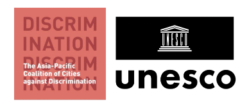About iccar
International Coalition of Inclusive and Sustainable Cities
history
The International Coalition of Inclusive and Sustainable Cities – ICCAR, was launched by UNESCO in March 2004 following the call made for a common front in the global fight against racial discrimination during the World Conference against Racism, Racial Discrimination, Xenophobia and Related Intolerance that took place in Durban, South Africa in 2001.
Since its inception, and its revitalization in 2014, ICCAR has grown to become an active global front against racism and discriminations with over 500 members across the globe. ICCAR has become a reference as a unique city-level platform in the UN system and in the international community that undertakes a wide range of initiatives – ranging from policymaking, capacity-building to awareness-raising activities. It advocates for global solidarity and collaboration to promote inclusive urban development free from all forms of discrimination.
Building on the adoption of the New Urban Agenda during Habitat III, ICCAR has established a common voice for cities striving to fight against societal ills that result from social transformations including rapid urbanization, human mobility, and rising inequalities.
priorities
ICCAR is composed of seven regional and national Coalitions. Each Coalition responds to specific priorities and challenges set out in a Ten-Point Plan of Action.
The Ten-Point Plan of Action is composed of ten commitments covering various areas of competence of city authorities such as education, housing, employment, and cultural activities. It proposes examples of practical policies for city authorities to enhance or develop. Signatory cities undertake to integrate this Plan of Action in their municipal strategies and policies and to involve various actors of civil society in its implementation.
ICCAR is part of the UNESCO Cities Platform launched by UNESCO on the occasion of World Cities Day on 31 October 2019. By means of this new platform, UNESCO proposes a more strategic and comprehensive vision on its interaction with cities through coordinated action including all its areas of action.
